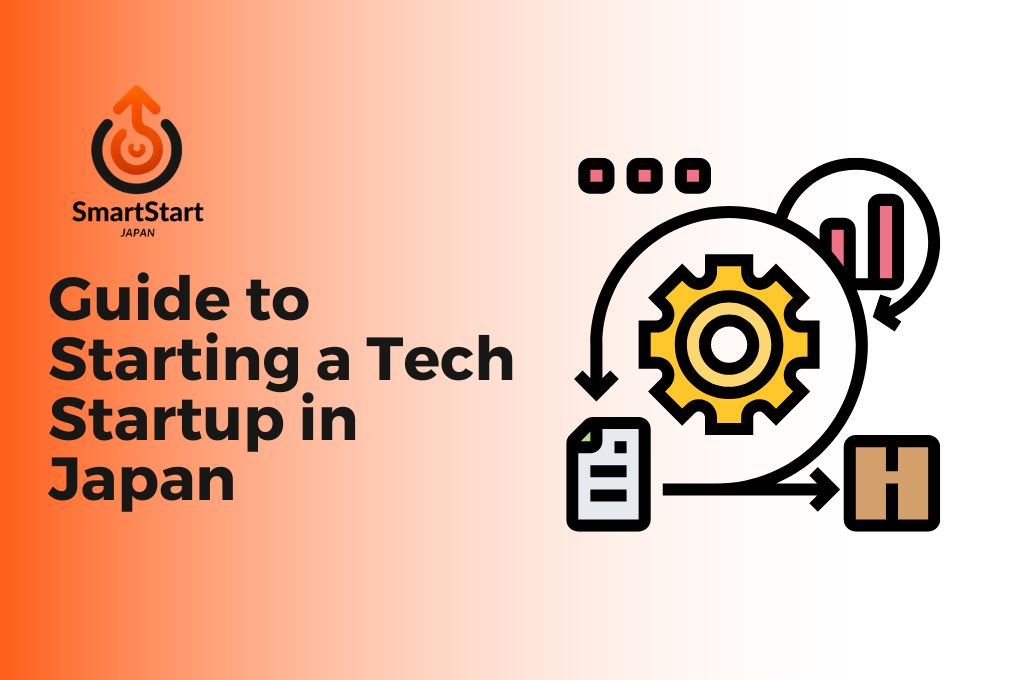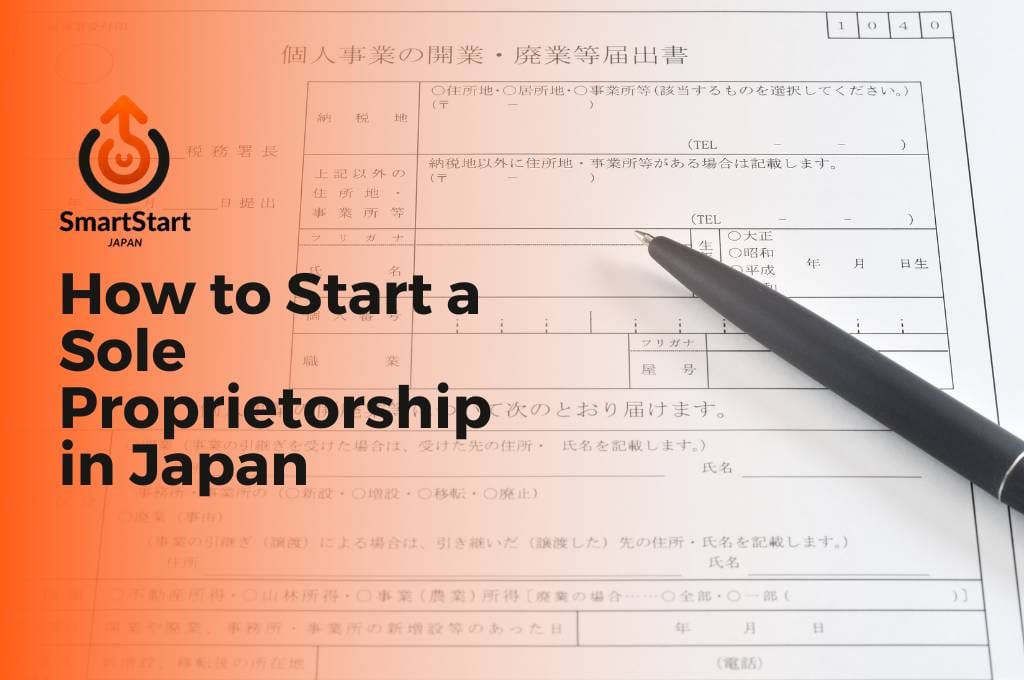Can I Start a Tech Start Up in Japan as a non-citizen?
Japan is a long-time leader in technology and innovation; however, starting a business in Japan will come with its unique set of challenges. If you are a foreign entrepreneur or a startup owner looking to expand and start a business in Japan, the short answer is YES. You don’t need to be a Japanese citizen or permanent resident to register a company here. However, things get a little more specific when it comes to actually managing and operating that business while living in Japan. Here are X steps to starting a tech startup in Japan.
- Can I Start a Tech Start Up in Japan as a non-citizen?
- Check If You're Eligible to Start a Business in Japan
- Choose the Right Visa for Your Startup Journey
- 5 Steps to Incorporate Your Tech Startups in Japan
- Funding Sources and Financial Support for your Business in Japan.
- Cultural and Communication Red Flags in Japan
- Conclusion
Check If You’re Eligible to Start a Business in Japan
You will need to apply for a visa that gives you the legal right to run a business. This is where the Business Manager Visa comes in. To qualify for it, you usually need to either invest at least five million yen into your business or hire at least two full-time employees who live in Japan. You will also need a physical office space, as a virtual office address would not be enough.
Choose the Right Visa for Your Startup Journey
There are a few different visas available to foreign founders, and choosing the right one can save you a lot of time and stress down the road. While anyone can register a company in Japan regardless of nationality, you will need the appropriate visa status actually to live in Japan and run your business full time.
Understanding Your Visa Options
There are two main visa types that foreign entrepreneurs usually consider when launching a tech startup in Japan. These are the Business Manager Visa, and the Startup Visa. Each comes with different requirements and benefits, depending on your stage of business and personal background.
| Business manager visa | Startup Visa | |
| Who Is This For? | Most common for foreign entrepreneurs who are ready to run a company in Japan. Fully operate and manage company in Japan without restrictions. | For those who are still in the early stages and not yet able to meet the requirements for the Business Manager VisaOffers a more flexible path |
| Requirements | At least five million yen in capital or has hired two full-time employees who live in Japan.Must have a physical office space. This means co-working spaces or virtual addresses usually will not qualify. | Temporary period which is now up to two years in 2025. Allows foreign entrepreneurs time to research market and establish a business in Japan.During this time, you are not required to have five million yen in capital or hire employees immediately. |
The most common visa for running a business in Japan is the Business Manager Visa. To qualify, you need a business plan, a registered office, and Once granted, this visa allows you to fully operate and manage your company in Japan.
If you’re just getting started and don’t yet meet those requirements, the Startup Visa is likely the better option. This visa gives you a, so that you can build your business before applying for a full Business Manager Visa. You’ll need to show a solid plan and get sponsorship from a participating local government, but you don’t need the capital or staff right away.
Each of these visa paths has its own strengths, depending on your background, funding stage, and business goals. If you’re not sure which one makes the most sense for you, Smart Start Japan’s Visa Transition Checklist can help you compare your options and prepare your application step by step.
5 Steps to Incorporate Your Tech Startups in Japan
Step 1: Choose the Right Business Structure
Once you’ve sorted out your visa path, the next step is setting up your company legally. In Japan, there are a few different business structures to choose from. The most common ones for startups are the Kabushiki Kaisha (or KK) and the Godo Kaisha (or GK).There’s also the option of registering a branch office if your main company is already established overseas.
Kabishili Kaisha (KK)
If you’re setting up a KK, you’ll need to prepare official Articles of Incorporation, notarize them, and deposit your capital into a Japanese bank account. For foreigners who don’t yet have residency, this process can be a bit tricky, but it’s absolutely possible with the right guidance. You’ll also need to choose a business name, register your company seal, and complete the legal filings at the Legal Affairs Bureau.
Godo Kaisha (GK)
A GK is simpler to set up and may be more suitable if you’re operating a small or early-stage venture. You are still required to prepare official Articles of incorporation documents in Japan. however you will not need to notarize them witch makes the process faster and cheaper.
Step 2: Choose and Register Company Name
- name in japanese or mixed characters (japanese and romans)
- “bank” and “insurance” are restricted unless relevant to your industry
- check for duplicates on The Ministry of Justice to avoid delays
Step 3: Prepare Articles Of Incorporation
Company Purpose: What are the business key activities?
Head Office Address: official registration address
Capital amount: Minimum Y1 for KK or GK; more recommended
Notarization is Required for KK (Y50,000 fee) but not GK

Step 4: Deposit Capital
Capital Contribution: Incorporators must deposit initial capital after creating the Articles of Incorporation.
Foreign Deposits: Foreign founders without a Japanese bank account can use a Japan branch of a foreign bank in their home country.
Proof of Deposit: A bank statement or transaction slip is required as proof during the registration process.
Step 5: Register with the Legal Affairs Bureau
Proof of Deposit: A bank statement or transaction slip is required as proof during the registration process.
You will need:
- Articles of Incorporation (notarized for KK)
- Capital Deposit Certificate
- Compant Seal Certificate (if applicable)
- Personal Id
Fees:
- KK: 50,000 Yen ($1,000 USDO) + notarization
- GK: 60,000 Yen ($400 USD)
Processing will take 1-2 weeks and once approved you will receive a company registration certificate. For more details, check out SmartStart to incorporation documents in Japan.
Funding Sources and Financial Support for your Business in Japan.
Starting a tech startup in Japan requires more than just a great idea. To bring your vision to life, you will likely need financial backing. Fortunately, Japan offers a growing number of funding options tailored to support both domestic and foreign entrepreneurs.
Whether you are looking for venture capital, government subsidies, or tax incentives, this section will help you understand what resources are available and how to access them.
Venture Capital and Private Investment
Japan’s venture capital scene is growing, especially in Tokyo, Osaka, and Fukuoka, with strong interest in AI, robotics, SaaS, and fintech.
Foreign entrepreneurs can boost their chances by:
- Building a local network
- Joining accelerators
- Pitching through partners like JETRO or Smart Start Japan
Preparing your materials in both English and Japanese can help attract domestic and international investors.
Government Grants and Subsidies
The Japanese government offers generous startup grants and government subsidies, especially in areas like green tech, advanced manufacturing, and digital services.
- Grants can cover office rent, salaries, and equipment
- Tokyo and Fukuoka offer up to several million yen for qualifying startups
- Some regions provide housing or relocation support
- You’ll need a detailed business plan to apply
- Help is available through local startup centers or SmartStart Japan’s subsidies and loans application services. If you are looking to get money from the government jumpstart your tech business in Japan, feel free to reach out for a free 30-minute consultation through our contact page.
Programs vary by location, so check what’s offered in your target city or prefecture.
R&D and Innovation Tax Incentives
Japan offers R&D tax credits that let startups deduct a portion of their research spending from corporate taxes, helping free up funds for growth. Foreign-founded companies can qualify if they’re incorporated in Japan and meet the program’s criteria. Startups in deep tech, AI, life sciences, or other research-heavy fields should explore this incentive.

Cultural and Communication Red Flags in Japan
Understanding corporate culture is just as important as business strategy if you want to succeed in Japan.
Read more here: Japanese Corporate Culture – Scaling Your Company
Product Localization
Localization is more than just translating your website. Japanese consumers tend to value quality, attention to detail, and service. If you want your product to succeed, it needs to reflect these values.
Start by translating all user interfaces and marketing materials into natural Japanese, not just literal translations. Use a local copywriter if possible. Pay attention to design and UX preferences that align with Japanese standards. Even your color choices, button placement, or font sizes can impact user trust.
It is also important to localize your customer service. Offering fast, polite, and efficient responses in Japanese is often expected, even from early-stage startups. Hiring bilingual staff or outsourcing support locally can help.
Understanding Japanese Tech Consumer Trends
Japan is a highly advanced tech market, but its consumers can be conservative when adopting new products. Japanese Tech consumer trends like robotics, smart homes, mobility-as-a-service, and fintech are growing rapidly, but trust and reputation play a huge role in adoption.
If you’re offering something new, be prepared to build credibility step by step. This might include beta testing with small Japanese user groups, publishing use cases, or forming partnerships with trusted local brands.
It also helps to work with regional accelerators or showcase your product at tech expos and innovation fairs, especially those endorsed by JETRO or METI. These events allow you to meet customers, investors, and collaborators in one place.
Working with Local Partners
Partnerships with local distributors, agents, or co-developers are often the fastest way to scale in Japan. Many startups succeed by working with a Japanese partner who already understands the customer base and regulatory landscape.
Before jumping into a partnership, take time to understand how your company will fit into their business model. Look for companies that have worked with foreign startups before or those that are fluent in English and familiar with international workflows.
You can also contact startup hubs or use Smart Start Japan’s City-by-City Guide to find recommended partners in your industry.
Do You Need Special Permits to Start Your Business?
Depending on the type of business you plan to launch in Japan, you might need more than just a visa and company registration. Certain industries require specific licenses or permits before you can legally operate. For example, if you’re opening a restaurant, you’ll need a food sanitation permit. Different government offices issue these permits and may require Japanese documentation, inspections, or proof of qualifications.
Conclusion
Starting a tech startup in Japan as a foreign entrepreneur is absolutely possible with the right planning and resources. From choosing the right visa to registering your business structure and securing funding, Smart Start Japan can help. Japan offers a wealth of government support, investment opportunities, and innovation-friendly ecosystems for new businesses. Building trust and localizing your product are essential to long-term success in this market. With our expert help and local partnerships, you can navigate the process more smoothly. If you’re ready to take the next step, Smart Start Japan offers expert guidance tailored to startups just like yours.



